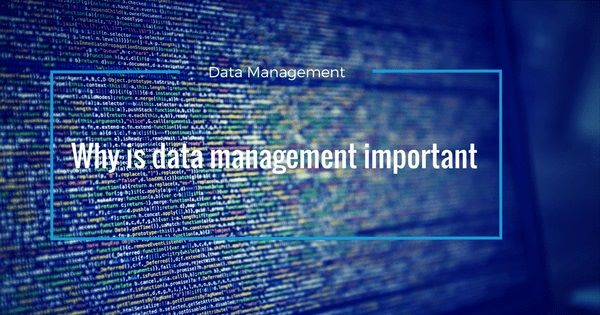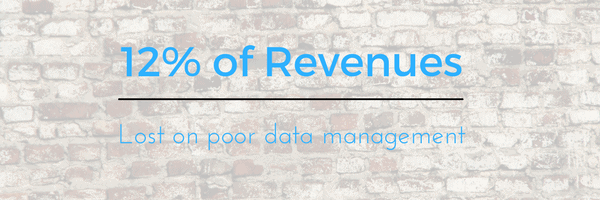Data management is the control, secure access, retention, and disposal of all of your company’s information. Companies are typically strong when it comes to creating information and maintaining correct access, but the biggest challenge remains: securely disposing and retaining information. Ineffective data management and making these top mistakes costs companies 12% a year, or on average $120,000 annually for a company with $1M in sales. Spend resources on developing your people and customer service. Get a quote to end your data management woes.
Why is data management such a big deal?
Data management helps ensure that the right people have the right information. Data can range from financial sales figures to employee performance ratings. Any and everything a company does can be quantified by data. This information may or may not be beneficial if unauthorized individuals have access to it.
Customer data is one of the most important and under-utilized assets of an organization. For example Wal-Mart used publicly available data to tailor store products to what locals are talking about and enjoying. In this way data acquisition, analysis, and insight execution are all important aspects.
Why data is so important?
Data management is a significant issue for it has impacts and bearing on :
- Productivity
- Cost efficiency
- Operational nimbleness
- Security
- Data loss reduction
- Accurate decision making
We cover each of these points in full on why data is so important.
Information provides insight into people. Insights into people can help companies better serve customers. Data is important because it can drive insights to a company’s strategies and execution. On the other hand, sensitive data about your customer’s home address or credit card information, if say, your company customer database was hacked, could mean lawsuits and loss of market credibility.
Data is important to a company because it is about its employees, customers, and future plans. Data is also valued on places like the dark web, a single consumer record is worth $50 with millions of lines of data often purchased. This means even a single database with a million unique customer data points can easily demand $50M.
What is data in a business?
Traditional or classical examples of data in business are receipts. Receipts are a printed form of data that includes at a minimum: date of transaction, type of money exchanged, price of exchange, and sometimes even a credit card number to identify the customer. This is data of which all companies have in some shape or form. A data is a single field within a receipt or record other data in business include:
- Customer name
- Customer address
- Products or services purchased by a customer
- How much tax was applied
- Interest on outstanding invoices
- Supplier ID
- Supplier services rendered
- Employee number
- Employee salary
It becomes pretty obvious that any piece of information is data. Which means the more data you can acquire the more knowledge and control you will have over how you operate or lead your team.
Acquisition of data is important because it allows companies to access and store information that it will need to better understand customers, internal operations, and employee performance. Without data there is no insight and that is simply one of the most pressing alternatives to local companies in Ontario lack of information gathering and tracking.
What is data management?
Data management is the systematic process, people responsible, and technologies employed to manage the entire life cycle of information with a company. In plain English, it means the way in which companies manage data so that it can be of value and protect it against being a liability.
The topic of what is data management and why it is important is spelled out in detail in a previous article.
How to make data work for you?
Professional organizations are aware that there is a ton of information around them already. The challenge is that they are often too busy to work more efficiently. This is because most companies hope that by continuing to serve customer that they are doing the best thing.
To illustrate how important it is to spend resources and time on getting data to work for you, Enterprise spent over $17M in helping them to crunch or better crunch their data. While SMBs only spent $1.6M according to a Forbes report. This means the most effective and industry leading organization in your field are spending 10x more on understanding their customer and operations better.
Here are some quick tips to getting data to work for you
- Budget an amount of time of operational resources to cleaning and crunching data: typically this means 5-10% of your teams time should be spent on getting and crunching data for improvements
- Make sure you see the results of the data and formulate a strategy to improve your operations and business
- Implement these changes with a small customer segment or select number of team members
- Measure the results of the changes and compare it with the existing data
- Determine refinements to improve results in the pilot area or roll out to the rest of the company
Data management and the company’s digital leaky faucet: 12% revenue loss from redundant data
Experian reported that 12% of a companies revenue is lost on redundant data. Meaning companies are paying a premium for holding non-essential information and creating legal liability in the process. Despite having lots of data available one of the most significant drivers to costs are retention of redundant or value-elapsed data. That is useless information that isn’t required by your team but is retained unknowingly by leaving old documents in files or hard drives. The second is the poor disposal and lack of certified destruction process for your information. You don’t really know where your information is going if you simply leave it in the recycling bin or trash can.
The classic data management mistake is keeping records you no longer need and not properly disposing information so that they remain a vulnerability to your organization.
Avoiding the classic data management mistake
Organizations are recommended to get secure paper shredding, hard drive shredding, and records management solutions to ensure non-essential data is retained and creates liabilities.
The great thing about these common mishaps with data management is that they can be fixed today.
“Blue Pencil made our decision to move our files an easy one. They were competitive and professional in every aspect of the move, helpful before, during, and after. I love that I can call anyone on the Blue-Pencil team and get an answer right away, to me service is everything. Thank You!
– Ester Rossi, Morse Shannon LLP
Blue-Pencil enables good companies to do even better work with data management services
Blue-Pencil is experienced in helping companies secure their most vital information and offers a free security audit to businesses who want to defend rather than be defeated by data management paralysis.
High standards in information destruction services with NAID AAA and Privacy+ certification
Willing to invest in clients who have had poor records management or shredding services experiences
Training, resources, and support for your staff to become adept at information management
Big-picture strategy and best practices to help business stay ahead





